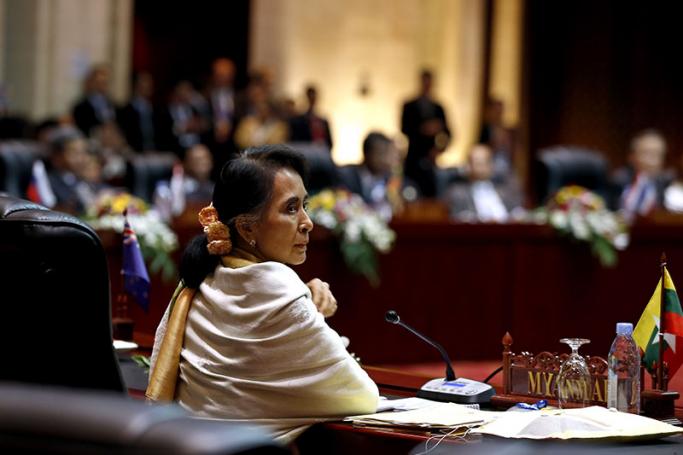The National League for Democracy-led government released its much-awaited economic policy on Friday but the document was scant in detail.
The three-page document, launched by the Ministry of Planning and Finance in a government meeting in Nay Pyi Taw, comes five months after Aung San Suu Kyi-Htin Kyaw government took up the reins of power.
Many observers are reportedly disappointed by the lack of financial specifics, given the importance the new government had said they placed in helping improve the economy.
Various observers have expressed concerns over the lack of specific details, including crucial financial indicators.
The paper released is just three pages outlining 12 policies ranging from promoting a transparent financial system to attempting to bring in new jobs.
Members of the media were barred from the meeting announcing the document’s release.
The business community has been questioning the government’s commitment to the economy.
Maung Maung Win, deputy minister of finance and planning, told Reuters the policy document was an "overview", and that more detailed plans on specific areas of the economy would be released in future. But he said he did not know when. "I cannot say the specific date," he said. "It will come, it will come."
One foreign advisor to the NLD, Sean Turnell, earlier this week called on people to be patient with the government, claiming work was underway and the government has a lot on its plate.
Mr Turnell told Reuters that the announcement served largely as a cover-all for policies under development that are meant to deliver the 12 goals. Among those are plans to simplify tariffs, establish a bond market and reform state banks. He told the news agency that the policy was very pro-market, liberal and prudent when it comes to economic management.
The economic brief promises support for agriculture, industry and infrastructure development.
The following is an unofficial translation of the released policy:
Economic Policy of the Country
The objective of the economic policy of the country
The economic policy of the country is a people-centred policy, and it aims that all can participate and improve the economy. It aims to help national reconciliation, protect natural resources and set an economic framework in order that natural resources will be allocated equally among states and regions.
The objectives of the country
To use as a policy that will support national reconciliation and help make the country to become a united federal democratic union
To create good economic situations in which Regions and States will develop equally
To use it as an economic policy that will create opportunities to nurture the young generation in order that they have great capacities for the country
To establish an economic system in which all citizens can cooperate to always get good results by innovation and effort
Economic Policies of the Country
To increase financial resources by using a transparent, good and strong public financial management system
To make state-run businesses more successful, to privatize some state-run businesses that can be changed, and to support small and medium enterprises that will improve the economy
To nurture human resources that can create a modern and developed economy, and to develop academic and professional subjects
To give high priority to develop infrastructure such as electricity, roads and ports, and to set up a “Data ID Card System”, “Digital Government Strategy” and “e-Government System”.
To create job opportunities for all Myanmar citizens who live in Myanmar and who arrived back from foreign countries to Myanmar, to give high priority to the businesses what can create many jobs
To establish an economic environment in which the agricultural sector and industrial sector are balanced and improve equally in order to progress in every field, to create enough food sources and to increase exports
In accordance with the market economy, [we need to] draw and set other separate policies to improve the private sector, to allow every citizen to freely operate the businesses they want, and to increase foreign investments, and [we need to] work in order to protect copyrights and to have rule of law
To use a financial system that can encourage long-term development of households, farmers and businesses in order to make the financial sector stable
To establish towns that are compatible with environmental conservation, to enhance public services, to create more public places, and to protect cultural heritages
To establish an effective and fair tax system in order to increase the country's tax income, and to protect the citizens' rights and their rights to own property by enacting laws and procedures
To adopt techniques and procedures that will support intellectual property rights in order to encourage abilities related to innovation and advanced technology
To identify the business situations that are likely to change in the ASEAN region and other regions in order to establish our businesses in accordance with great wisdom
You are viewing the old site.
Please update your bookmark to https://eng.mizzima.com.
Mizzima Weekly Magazine Issue...
14 December 2023
Spring Revolution Daily News f...
13 December 2023
New UK Burma sanctions welcome...
13 December 2023
Spring Revolution Daily News f...
12 December 2023
Spring Revolution Daily News f...
11 December 2023
Spring Revolution Daily News f...
08 December 2023
Spring Revolution Daily News f...
07 December 2023
Diaspora journalists increasin...
07 December 2023
Stay-at-Home Order in seven townships of Yangon region as COVID cases reach 919












